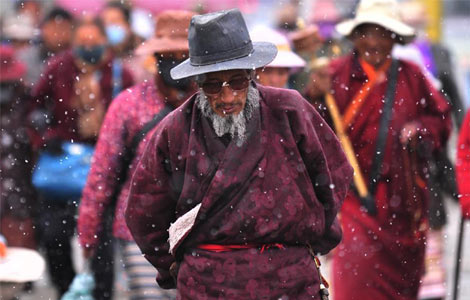The road once taken
Updated: 2013-10-29 08:12
By Cui Jia (China Daily)
|
||||||||
Blurred identity
Of the eight modern-day Xibe who completed the emotional journey in August, four came from Qapqal while the rest were natives of Northeast China. They said their ethnic identity has become so blurred that they have had to search hard to reclaim it.
"We know we are Xibe people and that's about it. No one speaks the Xibe language or follows the traditions anymore, not even the elderly. It's extremely sad," said Meng Xianming, the Party chief of Laohutou village in Kaiyuan city, Liaoning province. About 10 percent of the Xibe soldiers dispatched to Xinjiang hailed from Kaiyuan.
Laohutou has 1,816 residents, and 1,642 of them are Xibe. Meng, 46, was determined to revive the ethnic culture in the village by following his ancestors' original route north and then westward.
As the group traveled along the country roads to Laohutou and saw the flowing canals and corn growing on both sides, the Xinjiang members of the party were surprised at the familiarity of the scene.
"It was just like Qapqal," said Zhang Xuewei, 44, one of only three women in the group, who works for an international organization in Beijing. The Xibe who migrated westward replicated their northeastern lifestyle by digging canals and irrigating the farmland with water from the Ily River.
Because the Xibe in Xinjiang live by farming rather than herding they have never had disputes over grassland rights, so their relationship with the Kazaks has always been harmonious, according to Gorlod Gelig, 52, a researcher into the lives of nomadic people in China and Mongolia, who is based in Hohhot, the capital of the Inner Mongolia autonomous region.
In Laohutou, the villagers were curious about their visitors, who, after all, might be their blood relatives. Guan Dazhi, 36, displayed his family tree, written on a piece of cloth that had turned yellow over time. Circles were marked beside the names of his male ancestors who were sent to Xinjiang.
"If the family had two boys, one had to go to Xinjiang, but they never came back," said Guan in his thick northeastern accent as he carefully refolded the fragile piece of cloth. He hoped that Meng's journey to Qapqal would help in the search for his long-lost relatives.
"I often wonder about how they are doing in Xinjiang. Thoughts of them have run in our blood from generation to generation. The two things I probably inherited from my Xibe ancestors are my enthusiasm for life and my drinking habit," he laughed.
 ABC apologizes for 'Kimmel' joke
ABC apologizes for 'Kimmel' joke
 Snowfall hits many areas of Tibet
Snowfall hits many areas of Tibet  Lang Lang named UN Messenger of Peace
Lang Lang named UN Messenger of Peace Antiquated ideas source of Abe strategy
Antiquated ideas source of Abe strategy
 Storm wrecks havoc in S Britain, leaving 4 dead
Storm wrecks havoc in S Britain, leaving 4 dead
 Women's congress aims to close income gap, lift status
Women's congress aims to close income gap, lift status
 Sao Paulo Fashion Week held in Brazil
Sao Paulo Fashion Week held in Brazil
 Serena beats Li Na for WTA title
Serena beats Li Na for WTA title
Most Viewed
Editor's Picks

|

|

|

|

|

|
Today's Top News
Albright counsels fact not myth in US-China relations
Is Obama's lack of transparency really his fault?
San Diego Symphony debuts at Carnegie
Lang Lang takes on UN `Messenger of Peace’ role
At 72, China’s ‘Liberace’ still wows fans
Penn State: 26 people get $59.7m over Sandusky
China providing space training
Miscommunication causes conflicts
US Weekly

|

|








